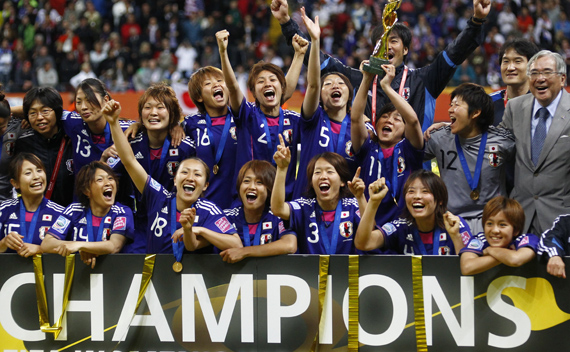Japan’s Heroines
More on:

What a game! The U.S. and Japanese women’s soccer teams faced off for the World Cup yesterday afternoon, and after an electric overtime comeback by the Japanese team, Nadeshiko Japan went on to win the match in penalty kicks. For soccer fans, it was a heart-stopping finale. For American fans who have been consumed with the vitality of their women’s soccer team, it was so close…
But for the people of Japan, it was a miraculous demonstration of what determination and skill can bring. As team captain Homare Sawa said, on the morning of the final match, the opportunity to play was “a gift from the soccer god.”
What a reaction! Coming through the semi-finals against Mexico, Germany and then Sweden, Japan’s women’s soccer team took everyone by surprise. Like American fans here in the U.S., Japanese soccer fans gathered at sports bars and city auditoriums, energized by the power of their women athletes. Many of these dedicated fans got up in the middle of the night to watch the Frankfurt-based World Cup match. In the Monday morning interviews in Tokyo, there was not a dry eye in sight. Japan’s television announcers themselves could barely keep their voices steady, or their tears from overflowing. Like the Nadeshiko Japan athletes themselves, the country seems stunned but overjoyed.
What timing! And here it is not just the timing of the kicks that made it into the net, or the resilience of the Japanese team that came in at the end to take the lead from their dynamic American adversaries. Sawa, in her post-game interview, said that above all she and her teammates hoped their victory gave Japan’s disaster victims a sense of power and hope. As incredible as these Japanese women athletes were on the field, we all understood that the women of Nadeshiko Japan knew it was not just soccer that was at stake. One of the players, Karina Maruyama, was a worker at the Fukushima Daiichi plant, and almost didn’t play because of the disaster. Coach Norio Sasaki reportedly reminded them of how much hope their presence in the finals alone brought to those at home. It was as if the entire country was playing in Germany. And, after they won, Japan’s athletes returned to the field with a sign thanking Japan’s friends around the world for their support in the wake of the March 11 disasters.
Japan’s women’s soccer team will arrive home in Japan today, tired and probably still stunned by their World Cup victory. As in so many countries around the world, this will change the lives of generations of Japanese women. They have emerged at the top of their game, claiming the World Cup, and reminding their country—and the world—that Japan has what it takes to compete. The soccer god must be smiling, indeed.
But for a devastated Tohoku, and for a deeply-exhausted Japan still grappling with the effects of the Great East Japan Earthquake, Japan’s women athletes are a godsend of a different sort. The women of Nadeshiko Japan have also shown the Japanese people that when Japan needs it the most, they really can muster the strength and the spirit to prevail.
More on:
 Online Store
Online Store